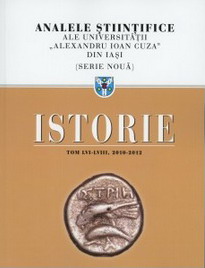Practici administrative şi mize academice. Universitatea din Iaşi şi problema Facultăţii de Teologie în anul 1941
Administration practices and academic stakes. The Iaşi University and the problem of the Faculty of Theology in 1941
Author(s): Marian Hariuc, Adrian VițalaruSubject(s): History
Published by: Editura Universităţii »Alexandru Ioan Cuza« din Iaşi
Keywords: the Faculty of Theology; the University of Iaşi; the Ministry of National Education; Mihai David
Summary/Abstract: The immediate consequences of the territorial losses of the summer of 1940 have determined the Romanian state to take a series of measures that have directly influenced the academic scene. After the Bolshevik troops entered Bessarabia, Bukovina and the province of Herţa (June 28, 1940), the Romanian institutions of higher education have taken refuge in country areas that were not under the threat of being occupied. Thus, the University of Chernivtsi moved to Suceava, and the Faculties of Theology and of Agronomy from Kishinev, extensions of the University of Iaşi, have returned under its dome. The present study focuses upon the decisions that have profoundly influenced the theological higher education of the three university cities – Iaşi, Chernivtsi and Kishinev – within the context of the return of the Romanian administration (June – July 1941) in the territories lost in the previous year. In this sense, the existence of a Faculty of Theology became a highly disputed subject, implying both the leadership of the state, and, especially, voices of high authority in the academic environment, such as the management of the University of Iaşi. The abolition of the Kishinev Faculty of Theology (October 1941) was immediately followed by the decision of the analogous Faculty of Chernivtsi to enter under the control of the University of Iaşi. Thus, the new image of the Romanian theological higher education represented the result of pressure coming from the management of the Iaşi university, but also from the leading hierarchs of the Romanian Orthodox Church. Their intentions of keeping the "cultural capital of Moldova" on an influential position within the Romanian higher education environment have repeatedly encountered the authoritarian measures taken by the Antonescu regime, measures which aimed especially at the administrative problems from Bessarabia and Bukovina.
Journal: Analele Ştiinţifice ale Universităţii »Alexandru Ioan Cuza« din Iaşi. Istorie
- Issue Year: 2012
- Issue No: 56+58
- Page Range: 347-358
- Page Count: 12
- Language: Romanian
- Content File-PDF

